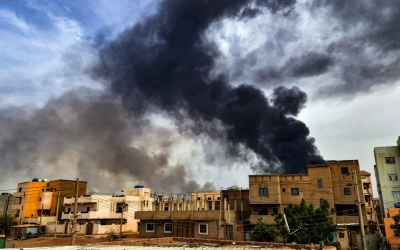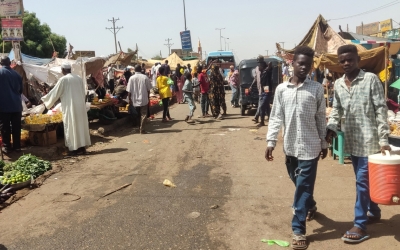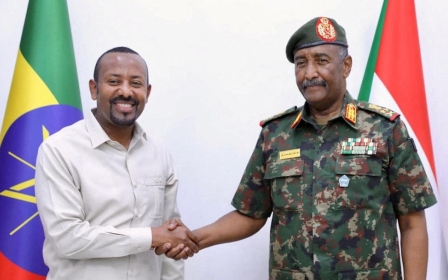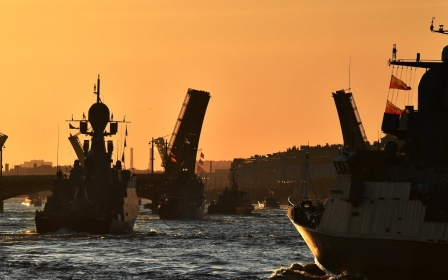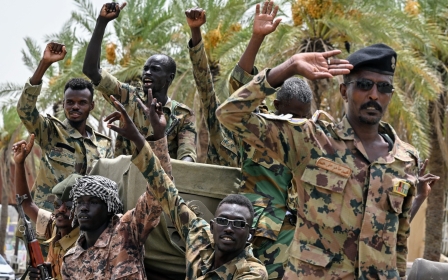Sudan: RSF committing massacres on daily basis as peace talks falter
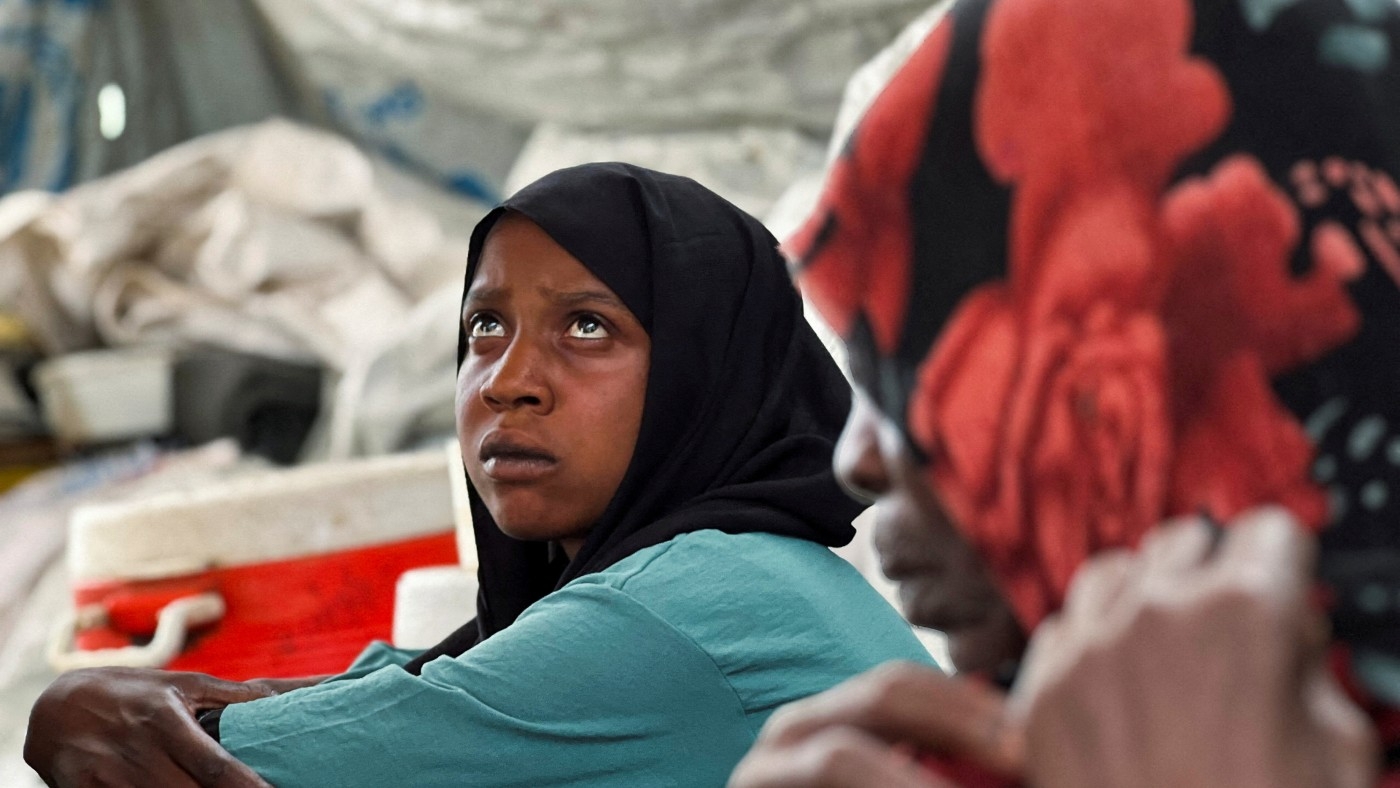
As peace talks continue to falter, people in Sudan face daily massacres perpetrated by the Rapid Support Forces (RSF) paramilitary, according to multiple eyewitnesses who spoke to Middle East Eye.
The massacres are taking place every day across the country, particularly in Gezira and Sennar states in central Sudan.
During RSF attacks, fighters have also attempted to abduct young women and girls and have raped and sexually assaulted them. They have also looted property and burned down buildings.
The civilian massacres have also been carried out in White Nile state, while the RSF is besieging major cities in Blue Nile, North Kordofan and, more prominently, el-Fasher, the capital of North Darfur.
They have occurred before, during and after the RSF sent a delegation to Geneva to attend the August peace talks. The paramilitary’s adversary, the Sudanese Armed Forces (SAF), has been at war with the RSF since 15 April 2023 and did not send a delegation to the talks.
New MEE newsletter: Jerusalem Dispatch
Sign up to get the latest insights and analysis on Israel-Palestine, alongside Turkey Unpacked and other MEE newsletters
Representatives from the United States, Saudi Arabia and the United Arab Emirates, among others, were present. The UAE is the RSF's main patron.
Rejecting the talks, army leader Abdel Fattah al-Burhan said the military would “fight for 100 years” if necessary to defeat the RSF. Recently, army-aligned officials met with US officials in Cairo.
On the same day the RSF delegation arrived in Geneva, RSF soldiers massacred around 80 people in Sennar state. The paramilitary has previously been charged with genocide and ethnic cleansing in Darfur but continues to deny the most serious accusations levelled against it.
Meanwhile, the RSF, with the help of international public relations firms based in the UAE, has been trying to bolster its public image by posting a series of videos and photos that show its provision of services to civilians in the areas of Sudan it controls.
The army, on its part, continues to bomb the RSF’s supply routes, as Sudanese civilians fear that it cannot properly protect them.
Self-defence groups
On 14 August, during the opening sessions of talks in Geneva, the RSF made promises in front of international envoys to open humanitarian corridors and stop the suffering of civilians.
However, in Abu Gota, in Gezira state, the RSF attacked the village of Goz el-Naga, killing dozens of civilians, according to multiple sources.
'We won’t surrender to these militias. We have at least the honour of attempting to defend ourselves and protect our people'
- Osman Ahmed Alamin, Sudanese civilian
The Abu Gota resistance committees reported that 33 people were killed in one day in the village. Other estimates put the figure at 40, saying that dozens of villages in the same area have been attacked over the last week.
Eyewitnesses described full-scale attacks that engulfed entire villages and led to the killing of civilians, the looting of property and crops, and the rape or attempted rape of dozens of girls and young women.
Civilians who fled Goz el-Naga told MEE that local youth had mobilised to defend the entire area.
Osman Ahmed Alamin said the youth of Goz el-Naga had organised, collected weapons and fought to protect their village.
“The youth of the village has been defeated after a strong, brave and noble sacrifice to defend their people. The majority of them have been martyred while they were defending their land and people,” he told MEE.
“We won’t surrender to these militias. We have at least the honour of attempting to defend ourselves and protect our people,” he said over the phone.
The RSF has attacked numerous villages in the area, including al-Faki Hamid, Kambo al-Siddiq, Abdaina and many others.
Abduction attempts
RSF soldiers have also tried to abduct girls from Gilangi village in the Abu Hugar area of Sennar state, according to eyewitnesses who spoke to Middle East Eye.
The attempted abduction resulted in a massacre that left 87 civilians dead, the witnesses said.
Alamin Ahmed al-Amin, who fled from the village after the attack in August, told MEE that the main reason for the attacks was the RSF’s intent to abduct dozens of young girls from the village.
“The youth had already started to organise and armed themselves in order to try and defend their sisters, mothers and relatives against the RSF, which invaded the village and tried to abduct the girls,” he said.
'For three consecutive days, the RSF used all kinds of heavy weapons, including heavy guns and artillery mounted on military vehicles, to attack the village'
- Alamin Ahmed al-Amin, eyewitness
“They succeeded in repulsing them at the beginning and sent the majority of the women to safe places outside the villages,” Amin said.
“But the RSF attacked the village again with bigger armaments and equipment, including heavy vehicles and guns and larger numbers of soldiers. The attacks continued for three days, leading to the killing of 87 people, including those who didn’t carry weapons. We have the names of all the deaths,” he said.
“For three consecutive days, the RSF used all kinds of heavy weapons, including heavy guns and artillery mounted on military vehicles, to attack the village, killing the youth and looting all the properties, including even the livestock in the village,” Amin added.
A young woman who fled from the village recently told MEE that RSF fighters had attempted to abduct her and other women from the village before local fighters forced the RSF fighters to leave.
“Me and four other girls were subjected to an attempt of abduction in the middle of the village by RSF fighters. But luckily, the local fighters from the youth of our village intervened, so they left us and fled. We then fled the village to a safer place outside the village,” she told MEE on condition of anonymity because of security concerns.
Attacks have also taken place in the localities of al-Dali, al-Mazmom, Singa, el-Souki and elsewhere, focusing mainly on the looting of the harvest crops and other agricultural machines.
Forcible recruitment
According to The Middle Call, in Dinder, a town in Sennar state, the RSF tried to coerce young men into joining its ranks.
“The RSF is blackmailing the youth of the villages around Dinder to fight for it in return for food that has already been looted from the stores of the crops in the region,” the local news outlet said.
“These attempts are tactics intentionally used by the RSF to cause ethnic fragmentation among our communities in order to stop people from gathering in self-defence and protecting our people and land,” the report added.
In White Nile state, the attacks have reached the villages of al-Awag, al-Halba and others, resulting in civilian deaths and the looting of properties, including cars.
However, an eyewitness from al-Halba said self-defence groups from the village had successfully repelled an RSF attack.
Across several states, the army has intensified air strikes on RSF positions, including in the capital, Khartoum, East Darfur, North Darfur, Gezira and Sennar.
These air strikes have resulted in civilian casualties.
Geneva and the UAE
Amid widespread fighting and increasing loss of life, the Geneva talks faltered.
The army refused to send a delegation to Switzerland, partly due to the involvement of the UAE, the RSF’s main patron, as a moderator. After 10 days, no clear breakthrough was achieved, despite the announcement of the opening of two humanitarian corridors intended to save Sudanese civilians from famine and the ongoing war.
The RSF agreed to open a corridor from al-Dabbah in northern Sudan to Darfur, while the army had already opened the border crossing point at Adre, where Darfur meets Chad.
'The UAE remains accused of its role in fuelling the war by supporting the RSF, making it a stakeholder'
- Elwathig Kameir, Sudanese analyst
A member of the Sudanese army-aligned delegation that met mediators in Cairo at the end of August said they thought the RSF was stalling for time by claiming a commitment to peace.
“The RSF wants to pass the rainy season [March to October, with most rain falling between June and September], which obstructs the movement of its forces due to the inaccessibility of the roads and difficulties to sustain the supply, then it will carry out wide attacks,” the source, who requested anonymity due to not being authorised to speak to the media, told MEE.
However, the RSF delegation to the Geneva talks accused the SAF of deliberately using Sudan’s humanitarian needs as a tool against civilians, prolonging the war to allow the country’s Islamic movement – aligned with the former government of autocrat Omar Hassan al-Bashir – to return to power.
At a press conference in Geneva at the end of the talks, the head of the RSF delegation, Omar Hamdan, stressed that the RSF is committed to opening humanitarian corridors to deliver aid to the affected areas.
“We are committed to the entire results of the talks in Jeddah and Manama and the other round of talks... We have reached good recommendations regarding the opening of the humanitarian talks," Hamdan said. He added that the RSF could not continue to discuss a cessation of hostilities without the participation of the army, which he noted had boycotted the Geneva talks.
Sudanese political analyst Elwathig Kameir said that the army had made significant gains from the last round of talks, including US recognition of Burhan as the president of Sudan’s sovereign council and de facto head of state, as well as clear US condemnation of RSF atrocities.
However, he criticised the army’s leadership for boycotting the Geneva talks, arguing that they risked losing credibility and missing the chance to represent their position. He also stated that the UAE’s participation was an insufficient reason for staying away.
“In my opinion, the presence of the UAE as an observer does not harm Sudan in any way. Indeed, the UAE remains accused of its role in fuelling the war by supporting the RSF, making it a stakeholder,” he wrote.
"The Geneva negotiations are not the venue for resolving bilateral relations with the UAE, nor do they require the government to cease its efforts to draw attention to and ultimately end the UAE’s role, nor cease demanding that it bear the lion’s share of compensation for war damages and reconstruction."
Middle East Eye delivers independent and unrivalled coverage and analysis of the Middle East, North Africa and beyond. To learn more about republishing this content and the associated fees, please fill out this form. More about MEE can be found here.


